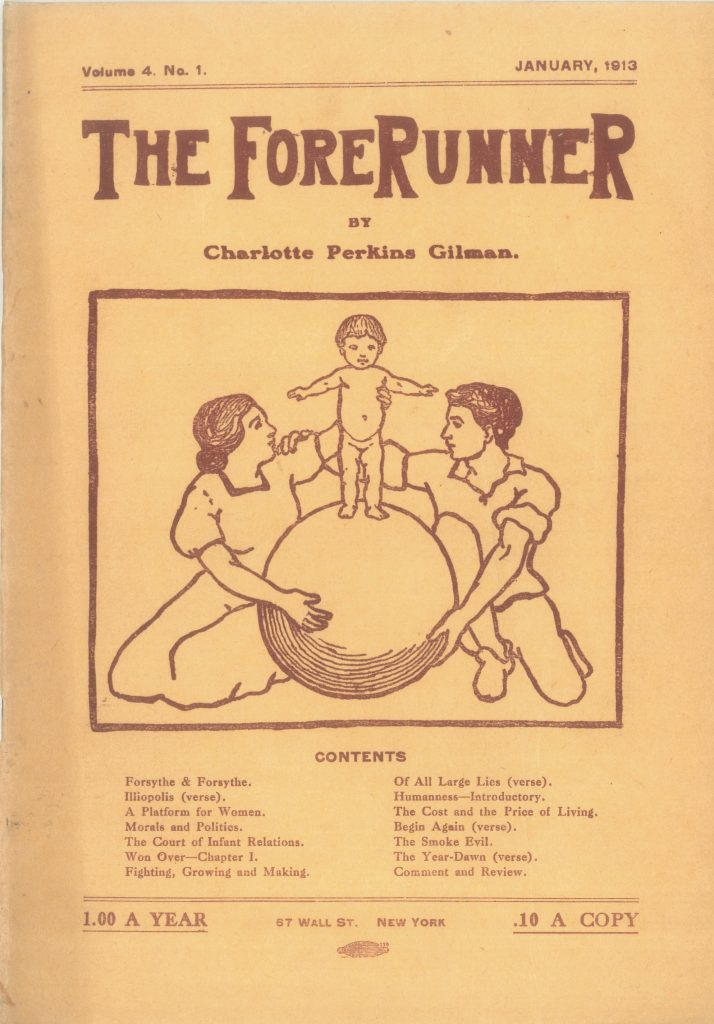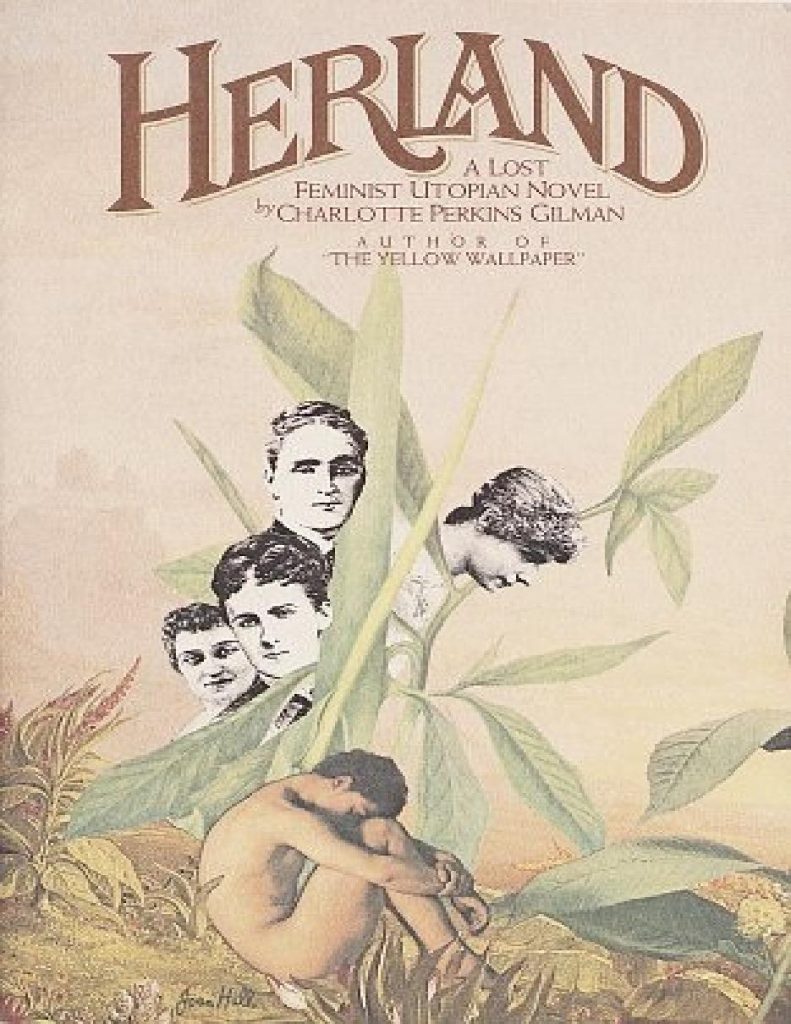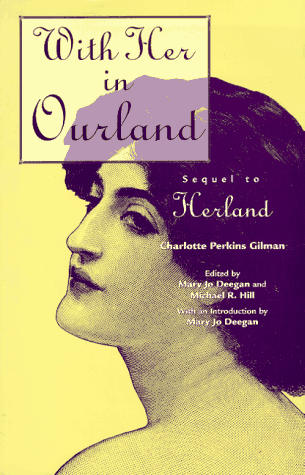By John Hertz: (reprinted from Vanamonde 1242)
Queenly women of forests unmanned,
How may we go to reach Herland?
Feat and feat and other feat.
May any helpful easement be?
Smooth each road that ye can see.
Every month from November 1909 through December 1916, Charlotte Perkins Gilman (1860-1935) wrote all thirty pages of The Forerunnner, including advertisements. She serialized Herland there (1915), and its sequel With Her in Ourland (1916; completed in F’s final issue).
By 1909 she was already famous for Women and Economics (1898), with four printings (nine by 1920), translated into Danish, Dutch, German, Italian, and Russian. She had speaking engagements across the United States and in Britain. Jane Addams praised her, and she worked at Hull House; William Dean Howells said she had the best brains of any woman in America. She played whist and chess. She was a contributing editor to The American Fabian.
I have not found she read Bellamy’s Looking Backward (1888) – that may be in her archive, Schlesinger Library, 3 James St., Cambridge, MA 02138 – but she appeared in the Nationalist, journal of the Bellamy movement, and was an officer in the Nationalist Club of Oakland, California.
Herland was neglected until Ann J. Lane (1931-2013) got Pantheon to republish it in 1979. On the back Joanna Russ says “It’s a lovely, funny book. There is a wonderful flavor of Golden Age science fiction, which adds to the fun and doesn’t in the least spoil the argument, which is still fresh and very much of today.”
Ourland was republished by Praeger in 1997. Mary Jo Deegan (1946- ) in a 57-page introduction calls it “no less witty, no less sage” (p. 1), “less pessimistic about human relations”, “more courageous” (p. 3), and regrets Lane’s moan, in a 24-page introduction to Herland, that “where Herland skips and sprints, Ourland trudges” (H p. xvi, O p. 5); on the contrary, there is (O id.) “hilarious satire…. Ourland is intellectually more difficult”.
In Herland three men hear of and then find a remote country, somewhere in South America, populated only by women for two thousand years. No other male visitors; no men hidden, nor born and expelled or worse; a woman bore a daughter parthenogenetically, it bred true, and their descendants thrive. “We had expected a dull submissive monotony, and found a daring…. a social consciousness…. a broad sisterly affection, a fair-minded intelligence…. health and vigor … calmness of temper” (ch. 7). The men each fall in love; marriages are invented; one man offends and must go, one couple stays, one man returns with his wife to the wide wide world as told in Ourland.
These might be science fiction; anyway, they are speculative fiction. We might deem them thought-experiments. With due respect to Russ and nil nisi bonum, my view is not that the fun doesn’t spoil the argument: I think the shoe is on the other foot.
Herland is neat, imaginative, warm-hearted; I’m not sorry I read Ourland, but. Eventually the emigrant asks her husband “What is your prejudice against socialism?” to which he – narrator of both books – replies “I was obliged to exhibit my limitations…. without waiting to be careful … I produced a jumble of popular emotions…. [she] laughed merrily, both at this nondescript mass of current misconception, and at my guilty yet belligerent air…. She … looked far past me – through me” (O ch. 9); alas, so must we with the author. Nero Wolfe in Prisoner’s Base (ch. 12; R. Stout, 1952) said “You also know when to stop.”
Discover more from File 770
Subscribe to get the latest posts sent to your email.




BBC Radio 4 has a 30 minute documentary on Herland, available via the radio section of the iPlayer here:
http://www.bbc.co.uk/programmes/b06yfhqr
Nifty to see the covers! I mentioned Herland a couple years ago in a blog post; Gilman is one of my heroes.
You can get Herland through Project Gutenberg. They even have one with illustrations.
Gilman’s Herland was the focus of the first chapter of my dissertation. The book is fantastic, but the politics of the book are pretty problematic, and get worse as you look into Gilman’s particular take on reform Darwinism. You can get an initial sense of my take on Gilman here, although the work in the chapter takes a more nuanced take on the subject. It’s a talk I gave at a conference and I wrote it before I had a chance to read more of the scholarship on Gilman, notably the work of Alys Weinbaum and Louise Michele Newman.
Just another note, James Tiptree’s ‘Houston, Houston, Do You Read?’ has so much in common with the novel, that it almost feels like a deliberate rewriting of the novel, but as far as I can tell, the story was written before the republication of the novel. Was there some way Tiptree could have read the book, or is it just a really, really remarkable coincidence?
Yay, Charlotte Perkins Gilman! I’ve collected all of her fiction, as much as I can. Oxford published a nice edition of her Forerunner short stories. They are nice pick-me-ups, especially the stories about older women remaking their lives.
I got a Signet 1992 MMPB for damn near nothing at a con a few years ago. It has some of her other stories too, like “The Yellow Wallpaper”, and some other stories from “Forerunner”. Edited/introduced by Barbara H. Solomon.
https://www.amazon.com/Selected-classics-Charlotte-published-Classics/dp/B00E28LRJY/ref=sr_1_73?s=books&ie=UTF8&qid=1491601127&sr=1-73&keywords=herland+by+charlotte+perkins+gilman&refinements=p_n_feature_browse-bin%3A2656022011
She was really good! Her prose isn’t nearly as lumbering as so much of the writing of that time was. She does get a bit didactic in places.
In “Herland”, I love how the men come in and mansplain about “Well actually, the natural order of things, of course. ” And then the women just look at them and say “Gee, that sounds awful for both men and women. Why?”
“Ourland” isn’t nearly as good. But if you can find the collection I linked, snap it up.
Pingback: My Life at Loscon, Episode 44 | File 770